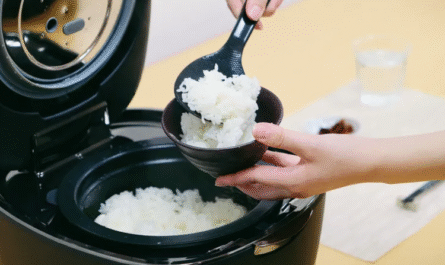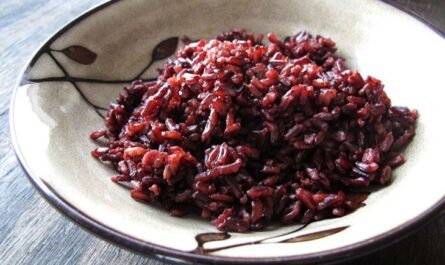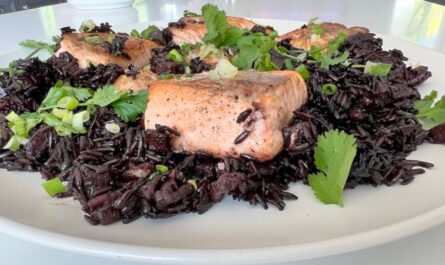In recent years, the superfood black rice has gained significant attention for its potential health benefits, especially in reducing inflammation. This ancient grain, once reserved for Chinese royalty, is now celebrated worldwide for its rich nutrient profile and medicinal properties. Black rice and inflammation have become a popular topic among health enthusiasts and researchers alike, and understanding this relationship is crucial for anyone looking to improve their diet and overall well-being.

Understanding Black Rice
Black rice, also known as forbidden rice, is a type of whole grain rice that is distinguished by its dark purple to black color. This striking color comes from its high anthocyanin content, a powerful antioxidant also found in blueberries and blackberries. As a whole grain, black rice retains its bran and germ, making it a rich source of fiber and nutrients.
Nutritional Profile of Black Rice
The nutritional benefits of black rice are impressive. It is packed with essential vitamins and minerals, including iron, vitamin E, and several B vitamins. Additionally, black rice is a good source of protein and fiber, making it a filling and nutritious component of any diet. For more details on the specific vitamins and minerals found in black rice, you can visit this resource.
The Link Between Black Rice and Inflammation
Inflammation is the body’s natural response to injury or infection, but chronic inflammation can lead to a host of health issues, including arthritis, heart disease, and cancer. Diet plays a crucial role in managing inflammation, and incorporating anti-inflammatory foods like black rice can be highly beneficial.
How Black Rice Reduces Inflammation
The high levels of antioxidants in black rice, particularly anthocyanins, help to neutralize free radicals in the body, thereby reducing oxidative stress and inflammation. Studies have shown that diets rich in anthocyanins can significantly lower markers of inflammation and improve overall health.
Incorporating Black Rice Into Your Diet
Adding black rice to your diet is easier than you might think, and it can be a delicious addition to a variety of dishes. Its nutty flavor and chewy texture make it a versatile ingredient in both sweet and savory recipes.
Black Rice Recipes
There are numerous ways to enjoy black rice. You can try a savory black rice soup, or use it as a base for salads and stir-fries. For dessert lovers, black rice can be transformed into a sweet pudding with coconut milk and mango.
Tips for Cooking Black Rice
Cooking black rice is similar to cooking other types of rice. It requires rinsing and soaking before cooking to reduce cooking time and improve texture. Here are some tips for preparing black rice:
- Rinse the rice under cold water to remove excess starch.
- Soak the rice for at least 30 minutes before cooking.
- Use a 2:1 water-to-rice ratio for optimal results.
- Cook the rice for 30-35 minutes until it is tender and the water is absorbed.
Health Benefits Beyond Inflammation
While black rice is known for its anti-inflammatory properties, it offers numerous other health benefits. Its high fiber content supports digestive health, while its antioxidant properties may protect against chronic diseases.
Black Rice for Weight Management
As a whole grain, black rice can aid in weight management by promoting satiety and reducing overall calorie intake. For more information on how black rice can be part of a weight loss plan, check out this guide.
Black Rice and Heart Health
The antioxidants in black rice may also support heart health by reducing cholesterol levels and improving circulation. Studies suggest that consuming anthocyanin-rich foods like black rice can lower the risk of cardiovascular diseases.
Conclusion: Embrace Black Rice for Better Health
Incorporating black rice into your diet can offer numerous health benefits, from reducing inflammation to supporting heart health. Its rich nutrient profile and versatility in cooking make it a valuable addition to any meal plan. Whether you’re looking to manage inflammation or simply enjoy a delicious and nutritious ingredient, black rice is a wise choice.
To learn more about the benefits of black rice, you can visit this external resource.

FAQs About Black Rice and Inflammation
What makes black rice anti-inflammatory?
The high levels of antioxidants, especially anthocyanins, in black rice are responsible for its anti-inflammatory properties. These antioxidants help reduce oxidative stress and inflammation in the body.
How often should I eat black rice?
Incorporating black rice into your diet a few times a week can be beneficial. It can be used as a substitute for white or brown rice in various recipes.
Can black rice help with weight loss?
Yes, black rice can aid in weight loss due to its high fiber content, which promotes satiety and reduces calorie intake. For more tips, see this article.
This article contains affiliate links. We may earn a commission at no extra cost to you.




